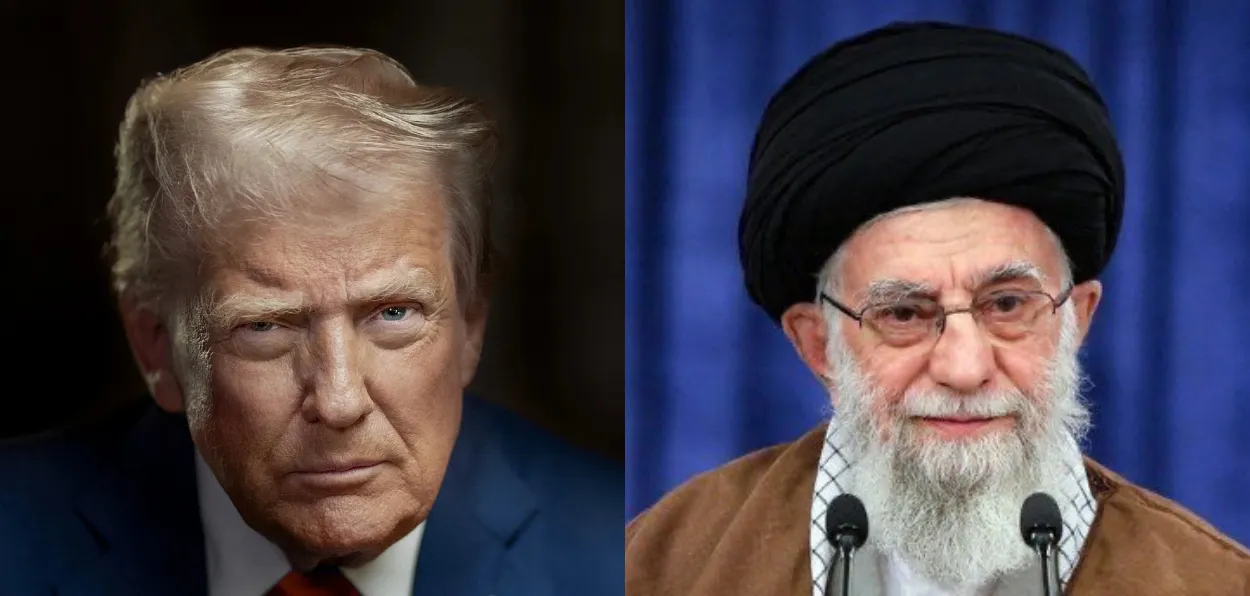
Washington
US President Donald Trump on Saturday (local time) said that the United States has launched an attack on three Nuclear sites in Iran. The development comes amid the ongoing conflict between Israel and Iran.
With this, the US seems to have finally entered the war with Iran in the wake of the ongoing conflict in the region.
Trump stated that the US had "successfully" hit three of Iran's key nuclear facilities--Fordow, Natanz, and Esfahan--with a "full payload of BOMBS" being dropped on Fordow as the primary target.
"We have completed our very successful attack on the three Nuclear sites in Iran, including Fordow, Natanz, and Esfahan. All planes are now outside of Iran air space. A full payload of BOMBS was dropped on the primary site, Fordow. All planes are safely on their way home," Trump stated.
He address his countrymen and posted his speech on X:
— Donald J. Trump (@realDonaldTrump) June 22, 2025
"Congratulations to our great American Warriors. There is not another military in the World that could have done this. NOW IS THE TIME FOR PEACE! Thank you for your attention to this matter," he added.
The underground site at Fordow and the larger Natanz plant were Iran's two primary uranium enrichment facilities, out of which Natanz had already been hit by Israel with smaller weapons earlier in the week, the New York Times reported.
Earlier in the day, several US B-2 stealth bombers took off from the Whiteman Air Force Base in Missouri on Friday night (local time) and were seen heading West, CNN reported, citing flight tracking data.
Trump with his decision to order US military strikes on Iran's nuclear facility is gambling that direct US involvement can deliver a decisive blow to a weakened Tehran while managing to avoid bringing the US into an expansive regional conflict.
Trump announced the strikes on three Iranian enrichment facilities — Fordo, Natanz, and Isfahan — and said that a “full payload of BOMBS was dropped” on Fordo.
It remained to be seen whether the attacks mark the totality of direct American involvement in strikes against Iran or the opening salvo of a larger campaign.
The decision to directly involve the US comes after more than a week of strikes by Israel on Iran that have moved to systematically eradicate the country's air defences and offensive missile capabilities, while damaging its nuclear enrichment facilities.
Iran's state-run IRNA news agency early Sunday acknowledged an attack on the country's Fordo nuclear site.
Attacks also targeted Isfahan and Natanz nuclear sites, it said.
IRNA quoted Akbar Salehi, Isfahan's deputy governor in charge of security affairs, saying there had been attacks around the sites. He did not elaborate.
Quoting a statement from Iran's Qom province, IRNA said: “A few hours ago, when Qom air defences were activated and hostile targets were identified, part of the Fordo nuclear site was attacked by enemies.”
The strikes are a perilous decision for the US, as Iran has pledged to retaliate if it joined the Israeli assault. The stakes are also high for Trump personally — he won the White House on the promise of keeping America out of costly foreign conflicts and scoffed at the value of American interventionism.
US and Israeli officials have said that American stealth bombers and the US 30,000-pound bunker buster bombs offered the best chance of destroying heavily fortified sites connected to the Iranian nuclear programme buried deep underground, including at Fordo.
Iran's Supreme Leader Ayatollah Ali Khamenei warned the United States in advance that strikes targeting the Islamic Republic would “result in irreparable damage for them”. And Iranian Foreign Ministry spokesman Esmail Baghaei declared “any American intervention would be a recipe for an all-out war in the region”.
Trump has vowed that he would not allow Iran to obtain a nuclear weapon and he had initially hoped that the threat of force would motivate the country's leaders to give up their nuclear programme peacefully.
But Trump appears to have made the calculation — at the prodding of Israeli officials and many Republican lawmakers — that Israel's operation had softened the ground and presented a perhaps unparalleled opportunity to set back Iran's nuclear program, perhaps permanently.
The Israelis have said their offensive has already crippled Iran's air defences, allowing them to already significantly degrade multiple Iranian nuclear sites.
But to destroy the Fordo nuclear fuel enrichment plant, Israel had appealed to Trump for the US bunker-busting bombs, the GBU-57 Massive Ordnance Penetrator, which uses its immense weight and sheer kinetic force to reach deeply buried targets and then explode. The penetrator is currently only delivered by the B-2 stealth bomber, which is only found in the American arsenal.
The bomb carries a conventional warhead, and is believed to be able to penetrate about 200 feet below the surface before exploding, and the bombs can be dropped one after another, effectively drilling deeper and deeper with each successive blast.
The International Atomic Energy Agency has confirmed that Iran is producing highly enriched uranium at Fordo, raising the possibility that nuclear material could be released into the area if the GBU-57 A/B were used to hit the facility.
Trump's decision for direct US military intervention comes after his administration made an unsuccessful two-month push — including with high-level, direct negotiations with the Iranians — aimed at persuading Tehran to curb its nuclear programme.
For months, Trump said he was dedicated to a diplomatic push to persuade Iran to give up its nuclear ambitions. And he twice — in April and again in late May — persuaded Israeli Prime Minister Benjamin Netanyahu to hold off on military action against Iran and give diplomacy more time.
ALSO READ: India could play a role in ending the Israel-Iran conflict
All the while, Trump has gone from publicly expressing hope that the moment could be a “second chance” for Iran to make a deal to delivering explicit threats on Khamenei and making calls for Tehran's unconditional surrender.
